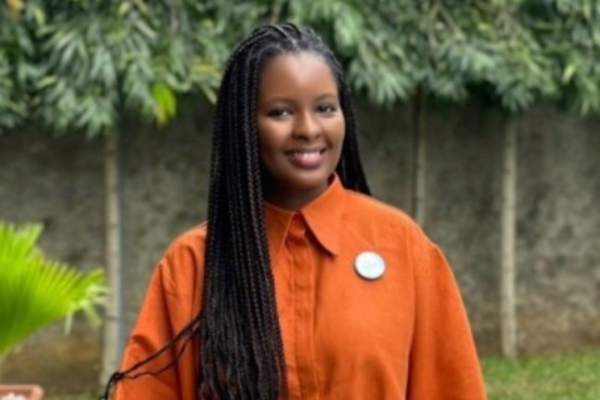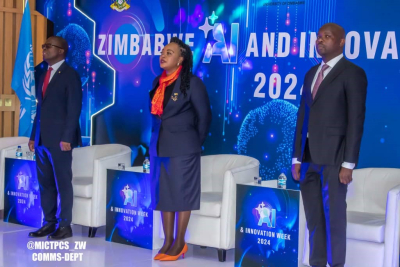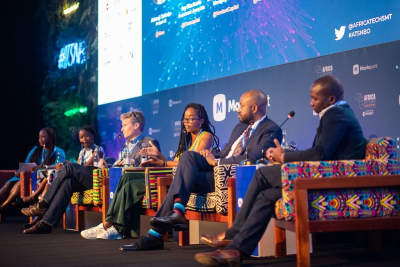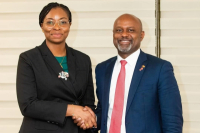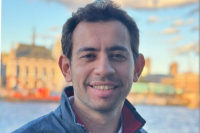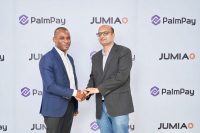A trained IT professional, he leverages his technological expertise to support financial services companies in Ghana. He actively promotes and encourages innovation among young people in the fintech sector.
Samuel Tettey Amanor (photo) is a Ghanaian tech entrepreneur and an expert in information technology (IT) solutions for financial services. He is the founder and chief executive officer (CEO) of BlueSPACE Africa Technologies, a startup specializing in the digital transformation of Africa's financial sector.
Founded in 2014, BlueSPACE Africa Technologies helps financial institutions digitize their products, services, and core systems to unlock the African market’s full potential. The company also offers advanced services in big data, machine learning, and deep analytics, enabling organizations to identify opportunities, address operational gaps, and make more informed decisions. Its solutions include treasury management tools and cross-border payment systems for businesses, individuals, organizations, and governments.
In 2021, Amanor established the BlueSPACE Innovation Hub, a center dedicated to identifying and developing fintech startups across the African continent. He also serves as vice president for partnerships and funding at the Ghana Fintech and Payments Association.
Amanor holds a bachelor's degree in computer science from Wayne College in the United States. From 2008 to 2014, he worked at Dell, where he held roles including account technology consultant, account manager for West Africa, and country director for Ghana.
By Melchior Koba,
Editing by Sèna D. B. de Sodji
She earned her degree in finance in France and England. After gaining several years of experience in the field, she decided to pursue entrepreneurship, focusing on the logistics sector.
Zeinabou Sidibe(photo) is a finance expert and entrepreneur from Mali. She is the founder and CEO of Afrisends, a company focused on transportation and logistics with the mission of democratizing international shopping and deliveries.
Founded in 2021, Afrisends aims to make global e-commerce accessible to Africans while streamlining supply chains for businesses. Through its digital platform, the company enables individuals to easily access products from around the world and assists businesses in enhancing their competitiveness. Afrisends connects users to a network of over 200 international suppliers, primarily based in China, Turkey, Dubai, and Europe.
As a logistics provider, Afrisends manages the transportation of goods by air, sea, or road, as needed by clients. The company also facilitates customs clearance, offers freight insurance, and provides last-mile delivery services in cities such as Abidjan, Bamako, and Dakar. Its digital platform allows users to track their inventory and deliveries in real time.
Zeinabou Sidibe graduated from the Université Libre de Tunis in 2010 with a bachelor's degree in finance. She continued her education in France, earning a master's degree in International Financial Management from ESG Finance in 2012, followed by another master's degree in Audit, Management Control, and Information Systems from SKEMA Business School in 2014. In 2015, she completed her studies with a master's degree in Audit and Consulting from ESCP Business School in England.
Her career began in 2012 at Attijariwafa Bank in France, where she worked as a corporate banking assistant. She later joined Société Générale as a project management controller. In 2013, she was appointed financial controller at Veolia Environnement, a company specializing in ecological transformation. In 2015, she became an auditor at Deloitte France. From 2018 to 2024, she served as a financial controller at PPG Industries, a multinational corporation known for its paints and coatings.
By Melchior Koba,
Editing by Sèna D. B. de Sodji
Africa’s focus on digital infrastructure development is crucial for fostering economic growth, bridging the digital divide, and positioning the continent to compete globally. Investments in these technologies are pivotal as they address long-standing challenges while unlocking new opportunities in various sectors.
Zimbabwe has made significant progress in developing its digital infrastructure through strategic investments in information and communications technologies (ICT), according to Minister of ICT, Postal, and Courier Services, Tatenda Mavetera. Speaking at the Zimbabwe Artificial Intelligence (AI) and Innovation Week held from December 9-13, Mavetera emphasized the country’s achievements in mobile connectivity and emerging technologies.
The event, organized in collaboration with the Government of Zimbabwe, the University of Zimbabwe, and the United Nations Development Programme (UNDP), showcased the nation’s commitment to digital transformation.
Mavetera highlighted Zimbabwe’s mobile penetration rate, which has surpassed 96 percent, and its internet penetration of 78.55 percent as evidence of the impact of prioritizing digital infrastructure. She described artificial intelligence as a game changer with the potential to drive innovation, enhance efficiency, and unlock economic opportunities.
The minister stressed that robust digital infrastructure is critical for supporting emerging technologies, fostering creativity, and enabling entrepreneurship. She noted that improved infrastructure has already facilitated significant developments, such as the introduction of e-learning platforms during the COVID-19 pandemic, which allowed schools to continue operating remotely. Other advancements include the increasing use of ride-hailing services, mobile money platforms, and telehealth initiatives, all of which are improving access to essential services.
Mavetera also underscored Zimbabwe’s adoption of smart agriculture, which provides real-time weather updates to enhance farming productivity and profitability. Additionally, the government has introduced e-government portals, e-procurement systems, and an electronic case management platform under the Ministry of Justice to streamline operations and enhance efficiency.
The World Bank's Digital Economy for Zimbabwe Country Diagnostic Report 2021 further underscores the nation’s progress. It notes that 96 percent of transactions in Zimbabwe are conducted through digital payment systems and that the country’s digital infrastructure is well-developed and expanding. However, the report emphasizes that addressing regulatory bottlenecks is crucial to sustaining this growth and meeting the increasing demand for digital services.
Zimbabwe’s push for digital transformation is aligned with its National Vision 2030, which aims to elevate the nation to an upper-middle-income society by 2030. This initiative underscores the government’s commitment to leveraging digital advancements to bridge the digital divide and unlock the full potential of a digital economy.
Hikmatu Bilali
To help people select the insurance policies that best suit their needs, Egyptian tech entrepreneurs have developed a comparison platform.
Amanleek is an online platform for comparing insurance offers, particularly in the automotive and health sectors. This digital solution was developed by an Egyptian startup based in Cairo, founded in 2019 by Ahmad Baracat, Ihab El Sokary, Mohab Aboueita, and Mohamed Mansour.
The startup collaborates with 18 insurance companies operating in Egypt. Its algorithm compares available offers to identify the best options. It has also integrated data and AI-driven insurance solutions to optimize its services according to users' needs. By digitizing the process of purchasing insurance policies and enabling the submission of required documents online, Amanleek has reduced the time needed from several weeks to just a few minutes.
Amanleek has established strategic partnerships with various companies, including players in telecommunications, Buy Now, Pay Later (BNPL) services, and payment networks, to facilitate financial transactions on its platform. Operating in over 20 governorates across Egypt, the platform claims more than 300 corporate clients. In July 2024, Amanleek was selected for the inaugural cohort of the Timbuktoo Fintech Hub.
The platform offers a mobile app available on iOS and Android. Users can create an account by entering their personal information and then providing the necessary details to allow the algorithm to suggest the best offers tailored to their needs.
Adoni Conrad Quenum
The seventh edition of the Africa Tech Summit Nairobi, powered by Nigerian fintech Raenest, will take place on February 12-13, 2025, at the Sarit Expo Centre.
It will feature a B2B summit, exhibition, and awards ceremony, focusing on four key tracks: Africa Money & DeFi Summit; Africa Climate Tech & Investment Summit; Africa Startup Summit; and Africa Mobile & App Summit.
The event will bring together over industry leaders, corporates, investors, and international delegations to explore Africa’s tech landscape.
Veeam Software and ITWeb will co-host a free webinar on Data Resilience for Africa on February 5, 2025, focusing on innovative solutions for secure and reliable data management.
The webinar will cover the new Veeam Data Cloud Vault v2, its Zero Trust Data Resilience approach, secure off-site cloud storage, and predictable cloud storage costs. It is aimed at CIOs, IT managers, backup administrators, SMB system administrators, and network administrators.
The event will showcase how Veeam’s tools enhance data backup, recovery, security, and availability across cloud, virtual, physical, SaaS, and Kubernetes environments.
Digital transformation has become a key driver for accelerating economic development. By leveraging strategic partnerships, countries aim to modernize their infrastructure and create an inclusive and sustainable digital ecosystem.
Guinea's Minister of Posts, Telecommunications, and Digital Economy, Rose Pola Pricemou (photo, left), met with a delegation from the Islamic Development Bank (IsDB) on Thursday, December 12. The meeting aimed to explore new funding opportunities in key digital sectors, including education, e-agriculture, digital health, financial inclusion through postal networks, and the "Giga" program.
“The minister emphasized the 'Simandou 2040' vision, championed by the Head of State, which places digital technology at the heart of sustainable development and digital infrastructure, contributing to economic integration, resource management transparency, and Guinea’s global market competitiveness,” the ministry noted in a statement.
This meeting aligns with Guinea's ambitions for digital transformation, which focus on modernizing public services, strengthening infrastructure, and fostering an inclusive digital ecosystem. The Simandou 2040 program shares these goals, aiming to rally the nation—especially its youth—towards creating a prosperous and equitable Guinea by 2040.
However, significant challenges remain in digitizing public services. According to the United Nations' "E-Government Survey 2024: Accelerating Digital Transformation for Sustainable Development," Guinea scores 0.4006 out of 1 in the E-Government Development Index (EGDI), ranking 29th in Africa and 160th globally. This is below the African (0.4247) and global (0.6382) averages.
The IsDB could play a pivotal role in advancing Guinea’s digital transformation by mobilizing financial resources and providing technical expertise. Its support could target initiatives in e-agriculture, digital education, connected healthcare, financial inclusion, and the development of robust digital infrastructure—helping drive sustainable and inclusive transformation across the country.
By Samira Njoya,
Editing by Sèna D. B. de Sodji
A serial entrepreneur, he co-founded three technology companies. He specializes in providing innovative solutions across multiple sectors, with a particular focus on e-commerce.
Ahmed Gaber (photo) is an Egyptian computer scientist and tech entrepreneur. He is the co-founder and CEO of TradeHub, which connects manufacturers with local and international buyers.
Founded in 2023 by Ahmed Gaber and Ahmed Atef, TradeHub is a global online platform designed to help users discover and purchase a wide range of products from sellers worldwide. The initiative aims to simplify exports, streamline business operations, and enable local manufacturers to more easily access both domestic and international markets.
The platform offers several key features, including the ability for buyers to issue tenders, request quotes, and communicate directly with manufacturers. “At TradeHub is to revolutionize trade operations, aiming to empower 10,000 manufacturing companies by the end of 2024, making trade smoother and easier for everyone,” the co-founders said at the platform's launch.
Ahmed Gaber’s entrepreneurial journey began long before TradeHub. In 2013, he co-founded Join, a file-sharing app for smartphones that allowed users to exchange images and music in real time across multiple Android devices within groups. In 2016, he co-founded Bosta, an on-demand delivery company in Egypt. Using innovative technology, Bosta enables individuals and businesses to quickly send packages across the city. Today, Gaber serves on Bosta’s board of directors.
Ahmed Gaber earned a bachelor’s degree in computer and systems engineering from Alexandria University in Egypt in 2010. Recognized for his talent and contributions to technological innovation, he was named to the Forbes 30 Under 30 list for the Middle East in 2021.
By Melchior Koba,
Editing by Sèna D. B. de Sodji
The country aims to leverage international cooperation to advance its space technology program. In June, it signed an agreement with YahClick, a subsidiary of the Emirati company Yahsat, which specializes in providing satellite internet connectivity solutions.
Nigeria is seeking partnerships with France in the field of space technology, the Managing Director of NigComSat, Jane Egerton-Idehen (photo, center), said on Thursday.
During a meeting with French Ambassador to Nigeria Marc Fonbaustier (photo, left) on Wednesday, Egerton-Idehen expressed interest in leveraging French expertise to advance Nigeria's satellite goals.
Nigeria plans to acquire two new telecommunications satellites by 2025 to replace NigComSat-1R, which is expected to reach the end of its 15-year lifespan in 2026. In October, President Bola Tinubu approved the deployment of four new Earth observation satellites to enhance the country's capabilities.
“[...] Sharing expertise allows us to learn from global leaders, which in turn accelerates innovation.It also matters because it boosts the economy. Satellite technology has the massive potential to transform industries like agriculture, education, and healthcare. And finally, it matters because of its global impact. Advancements in space technology improve connectivity and sustainability for everyone,” read a statement on Egerton-Idehen’s Facebook page.
Nigeria has shown particular interest in leading space companies such as Eutelsat and Thales. Thales, through its subsidiary Thales Alenia Space, has collaborated with several African countries, including Egypt, for which it built the NileSat-301 satellite launched in June 2022. In October, Thales signed a memorandum of understanding with Moroccan company Panafsat to develop a satellite communications system. The company has also partnered with the Democratic Republic of Congo and Monacosat on satellite internet projects.
While France possesses the expertise to assist Nigeria, the meeting between Egerton-Idehen and Fonbaustier was primarily described as a "formal courtesy." No official agreements have been signed.
By Isaac K. Kassouwi,
Editing by Sèna D. B. de Sodji
The synergy between fintech and e-commerce can drive economic growth by supporting small businesses, creating jobs, and improving efficiency in consumer markets. The rise in mobile wallets and online payment platforms like PalmPay plays a vital role in driving this transformation.
Fintech platform PalmPay announced, on December 12, a strategic partnership with Jumia, Africa’s e-commerce giant. The partnership enables Jumia shoppers to use PalmPay as a payment method at checkout, providing a seamless and reliable transaction experience through direct integration with the PalmPay wallet. This integration marks a pivotal step in enhancing the convenience and security of online shopping in Nigeria.
We're proud to announce a strategic partnership between @palmpay_ng and @JumiaNigeria, bringing together the best of e-commerce and fintech to enhance the digital payment ecosystem in Africa.
— PalmPay Nigeria (@palmpay_ng) December 12, 2024
The PalmPay wallet is now directly integrated into Jumia's checkout process in… pic.twitter.com/3pl1xnIeSG
Sofia Zab, PalmPay's Chief Marketing Officer, said, “This strategic alliance aligns perfectly with our shared commitment to delivering a superior user experience and exceptional value to our customers.”
The collaboration represents the beginning of a long-term alliance between the two industry leaders. Together, they aim to drive innovation, increase convenience for consumers, and foster the widespread adoption of digital payments across Africa.
In 2023, Nigeria saw electronic payment transactions total N600 trillion, marking a 55% increase from N387 trillion in 2022, according to the Nigeria Inter-Bank Settlement System (NIBSS). This growth highlights the swift adoption of digital payment systems, fueled by rising smartphone usage, better internet connectivity, and fintech innovations. The surge in digital payments is also driving the rapid expansion of e-commerce platforms like Jumia.
This partnership highlights the growing synergy between fintech and e-commerce in Africa, showcasing a commitment to advancing the continent's digital economy while promoting financial inclusion and a cashless society.
Hikmatu Bilali
More...
The digital age is transforming how public administrations operate. In response to these changes, countries are investing in advanced technologies to streamline their services and enhance their economic attractiveness.
Tunisia's customs authority on Thursday announced the "Nouveau système d’information douanier" (SINDA2), a strategic modernization initiative aimed at revolutionizing customs procedures. Scheduled for phased implementation starting in 2025, SINDA2 will integrate advanced technologies and promote a paperless environment.
"With SINDA2, we are introducing a system that simplifies processes, enhances economic competitiveness, and establishes more transparent and efficient customs management. This project is a critical milestone in our commitment to sustainable digital transformation," Abdelkrim Abidi, Director General of the National School of Customs, said in a statement.
Designed to encompass all customs procedures, SINDA2 will leverage advanced technologies to foster collaborative management between customs authorities and external partners. Key objectives include full digitization of documents, implementation of a risk management policy, and the promotion of a paperless workflow. A central feature of the project is interoperability with third-party information systems, which will strengthen interagency coordination and improve operational traceability.
This initiative aligns with Tunisia's strong performance in electronic administration, bolstered by previous digitization projects such as TUNEPS, the national online public procurement management system. According to the UN Department of Economic and Social Affairs (UN DESA) report, "E-Government Survey 2024: Accelerating Digital Transformation for Sustainable Development," Tunisia ranks first in North Africa and third continent-wide in online administration development, with a score of 0.6935 out of 1.
Through projects like SINDA2, Tunisia reaffirms its ambition to become a regional leader in digital transformation and modern governance.
By Samira Njoya,
Editing by Sèna D. B. de Sodji
The introduction of the e-Visa system is a pivotal step in Africa’s digital journey. It not only modernizes administrative processes but also signals the continent’s readiness to integrate more fully into the global digital economy, fostering greater international openness and economic development.
Chad has made a major stride toward administrative modernization and international openness with the launch of its electronic visa (e-Visa) system. The “eVisa.td” platform was officially unveiled on December 11 during a ceremony at the Direction Nationale de la Police in N’Djamena, presided over by the Minister of State and Minister of Finance, Budget, Economy, and Planning, Tahir Hamid Nguilin.
The e-Visa system simplifies the visa application process for travelers to Chad by digitizing procedures. Through the platform, available in French, applicants can create an account, complete an online form with personal and travel details, upload required documents, and pay the necessary fees. Once processed, visas are issued electronically.
This initiative is part of Chad’s broader efforts to modernize public services and enhance digital transformation. By streamlining international travel, the e-Visa system aims to boost Chad’s global appeal and attract more visitors, aligning with the Strategic Plan for Digital and Postal Development 2020-2030 (PSDNP). This ambitious roadmap underscores the government’s commitment to advancing the nation’s digital infrastructure and improving public services.
The e-Visa system also positions Chad as a more accessible destination, supporting its goals of fostering international engagement and promoting economic development through enhanced digital solutions.
Hikmatu Bilali
The digital transformation of education has become a priority in addressing the challenges of inclusion and quality in teaching. In Africa, innovative initiatives are reinventing pedagogical methods by incorporating technological tools tailored to local needs.
The Imaginecole project, launched by UNESCO to address the educational challenges posed by the COVID-19 pandemic, is entering a new phase. The initiative will now be managed by the Senegalese government and local education stakeholders, who are tasked with adapting it to the country's specific needs. This transition, marked by a dual workshop held in Dakar from December 9-13, reflects efforts to strengthen local capacity for integrating digital tools into education sustainably.
“We have reached a stage where we will hand over the project to Senegal. We have developed numerous training programs on digital tools, education, and even the use of artificial intelligence in classrooms. It’s time for national authorities to take the lead and continue this momentum,” said Idalina Ndiaye Rodriguez, regional coordinator for the Imaginecole initiative at UNESCO.
Designed to ensure continuity in education during crises, Imaginecole is a regional platform accessible in 11 Francophone African countries. It provides teachers and students with a variety of digital resources, ranging from educational comics to AI-driven tools. This initiative aligns with Senegal’s broader efforts to build an inclusive and effective education system. Notably, the country recently secured €70 million in funding from the Development Bank of Southern Africa (DBSA) to support the digital transformation of its education sector.
The transfer of Imaginecole is expected to modernize education in Senegal, making learning more interactive and accessible. The initiative also aims to boost student engagement, reduce educational inequalities, and position Senegal as a key player in the digital transformation of Francophone Africa’s education landscape.
By Samira Njoya,
Editing by Sèna D. B. de Sodji
Following his studies and several years of professional experience in France, he returned to his native Morocco. There, he provides businesses with IT solutions designed to streamline their operations.
Mhamed Harouchi (photo) is a Moroccan tech entrepreneur and the co-founder of ComptaCom Maroc, a company specializing in digital accounting. Established in 2022, ComptaCom Maroc empowers startups and very small businesses (VSEs) by providing access to an online accounting firm alongside a comprehensive management solution tailored to their needs.
The management software offered by the startup extends beyond accounting. It includes tax optimization, payroll management, and legal services. Additionally, ComptaCom Maroc provides Bleez, a cloud-based solution accessible anytime, anywhere. This innovative platform goes beyond billing and accounting to offer features like expense tracking and validation, online document storage, cash flow management, and document digitization. It processes and verifies all received documents while serving as a single point of contact for user inquiries and requirements.
Alongside his role at ComptaCom Maroc, Harouchi is a managing director at Ciel Informatique Maroc, a company that supports entrepreneurs and businesses by providing industry-specific software and expert assistance.
Harouchi’s educational background includes a master’s degree in civil engineering from the University of Technology of Compiègne (UTC) in France, earned in 2011. He also holds a master’s degree in real estate investment from Paris 1 Panthéon-Sorbonne, completed in 2012.
His professional journey began in 2012 at CBRE Global Investors, a U.S.-based investment management firm, where he served as a senior associate for the EMEA (Europe, Middle East, and Africa) region. From 2016 to 2020, he worked as a director at Colliers International Maroc, a real estate consultancy firm.
By Melchior Koba,
Editing by Sèna D. B. de Sodji



